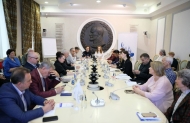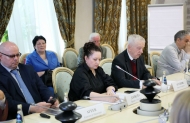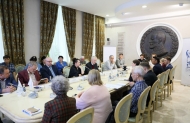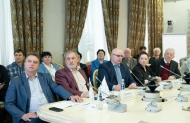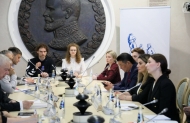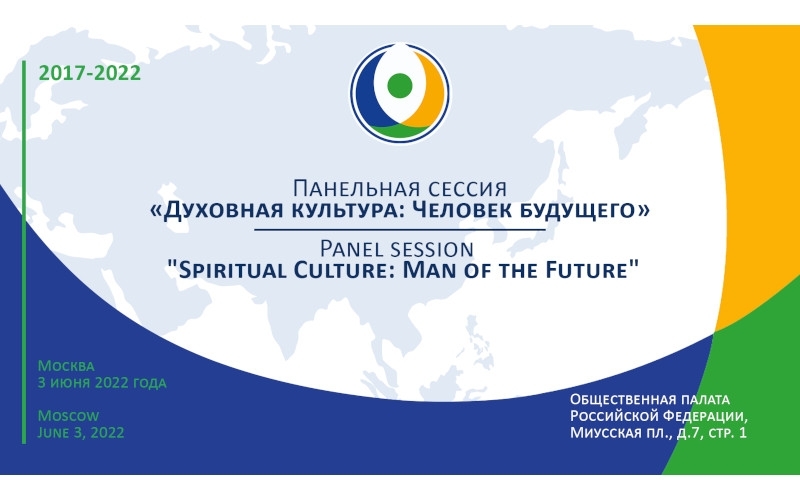
On June 3, within the International Forum of Public Diplomacy, dedicated to the 5th anniversary of the Eurasian Peoples’ Assembly, the Civic Chamber of the Russian Federation hosted the Panel session “Spiritual Culture: Man of the Future”.
The session was organized by the Council for Spiritual Culture of the Eurasian Peoples' Assembly and the International Center for Spiritual Culture.
The purpose of the event is to search for forms of spiritual harmony among the peoples of Greater Eurasia, to strengthen the role of spiritual and moral values, to expand the experience of applying the foundations of spiritual culture in social practice.
The panel session was held in a hybrid format. Among the participants were representatives of seven countries: Austria, Bulgaria, Germany, India, Russia, Mongolia, Uzbekistan.
The moderator was Irina Darneva, Chairman of the Council for Spiritual Culture of the Eurasian Peoples’ Assembly:
“When we talk about spiritual culture, we understand that it incorporates a system of high meanings, values, ideals that have crystallized at the present time as common basic values acceptable to all peoples.”
Yuri Ageshin, Vice-President of the International Association "Peace through Culture", a member of the Presidium of the World Forum of Spiritual Culture, made an extensive report:
“Humanity today will not only have to accept the highest values of Spiritual Culture, but also realize their greatness and significance, place and role in the transformations dictated by life. And the main thing is to make a conscious choice regarding the Spiritual Culture, raising it to the pedestal of the highest civilizational value, making it the strategy of life and the world.”
The speech of Alexander Ageev, General Director of the Institute of Economic Strategies, Deputy Secretary General of the Eurasian Peoples' Assembly, Doctor of Economics, Professor, expert of the Russian Academy of Sciences, was accompanied by a deep analysis of the situation in the world:
“The main imbalance is the colossal global injustice between resources and the consumption of these resources, which hinders peace and creates the main cause of tension. Parity protects against the most monstrous decisions. This requires competencies not only in rocket, space and nuclear issues, but also in the field of management and worldview. Cohesion is a colossal resource and task for our Assembly.”
Head of the Department of External Relations of the Gobind Sadana Institute for Advanced Study of Comparative Religion Mary Fisher from India has been implementing the foundations of spiritual culture in practice for decades. She showed the video "Work and Service" about the spiritual mission and social activities of Gobind Sadan:
“Many people think of spirituality as just sitting quietly in meditation. But Guru Nanak Dev Ji, the first Sikh guru, taught us: “The straight path to God is to work hard with honest means, always remember God and share with others.” These are the spiritual principles underlying the development of Gobind Sadan."
Alexandra Kumanova, professor at the State University of Library Science and Information Technologies in Bulgaria, full member of the UN International Academy of Informatization, drew attention to the universal books of mankind containing universal spiritual foundations:
“The spiritual is identified with the religious, moral cultural code. The spiritual is the eyes of morality in the universal tree of humanity, where we all call the same God by different names. Spirituality is the culture of seeing the other not as different, but as looking at the universe with his own categories, in which we see analogues of our ideas about the world.”
Nozimkhon Makhmudov, Chairman of the Board of the Public Foundation "Ibn Sino", deepening the topic of people’s diplomacy, spoke about the foundation's many years of experience in studying and widely promoting the rich heritage left to mankind by the doctor, scientist and philosopher Ibn Sino:
“One of the important tasks of the foundation is the spiritual education of the youth of Uzbekistan, as well as the establishment and development of international contacts with partner organizations.”
First Vice-President of the International Association “Peace through Culture. Europe” Liz Augustat (Austria) recalled in her speech:
“The real destructive trend is opposed by an ancient insight and wisdom that connects us to all living beings on this planet in a way that previously seemed unimaginable. If we strive for communication and cooperation, if we can overcome the selfish self, serving WE, the good of the world and the unification of peoples, then we will be able to answer the environmental, social and socio-political questions of our time.”
Marko Vukovic, Vice-President of the International Association “Peace through Culture. Europe” (Germany), also noted the paramount importance of ethical foundations in relations between people and nations.
“We try to find an answer to the question of what will be our future, the future of humanity. I know it sounds very utopian, especially now, due to the ongoing global events, but we will definitely see the light after the darkness is lifted.”
Further, during the discussion, various points of view were expressed related to the vision of the future structure of the world and the place of man in it.
Helga Sepp-LaRouche, founder and Chairman of the Schiller Institute (Germany), raised in her speech the important topic of humanitarian assistance to the people of Afghanistan as an example of spiritual and practical connection with the best achievements of the great Avicenna:
“Ibn Sina's humanitarian program is designed to add a kind of spiritual quality to social efforts, a vision of a better past that underpins a better future. When the country and the people have gone through so much suffering, it is necessary to add a new quality to raise the spirit of the people.”
Maxim Mikhalev, Scientific Director of the Dorzhievsky Society of Ethnogeopolitics, Doctor of Historical Sciences, Professor of the Russian State University for the Humanities:
“I would like to reduce the degree of today's discussion a little: do not be upset about the fact that everything is bad. On the other hand, do not hope that we are at the beginning of some kind of brightest era. There will be no end to history. The world will not turn upside down. And man has always been both spiritual and material.”
Daria Slozhenikina, representative of the Charitable Foundation "Dialogue of Cultures - One World":
“In this rapidly changing era, it is very important not only to preserve the cultural diversity of our world, but also to cultivate interest among young people in learning about this cultural diversity. Our foundation serves these goals by actively expanding international cooperation.”
Maria Ulyanova, Ph.D. in Philology, an expert in the field of education and culture in China:
“The consolidating structure of any community is a cultural code based on language. It is very important at the present time to form an image of the future, the practical component of which lies in cultural codes, cultural and civilizational bonds.”
All participants shared their experiences, stressed the need to continue research related to spiritual culture, with the establishment of spiritual and moral values and cultural traditions of peoples in society. It is proposed to expand the dialogue on the designated topics at the sites of the St. Petersburg International Cultural Forum, the Museum of the Sun in Novosibirsk, the annual conference in Nur-Sultan dedicated to the Day of Spiritual Accord, in the Dorzhievsky Society of Ethnogeopolitics of the Russian State University for the Humanities.



